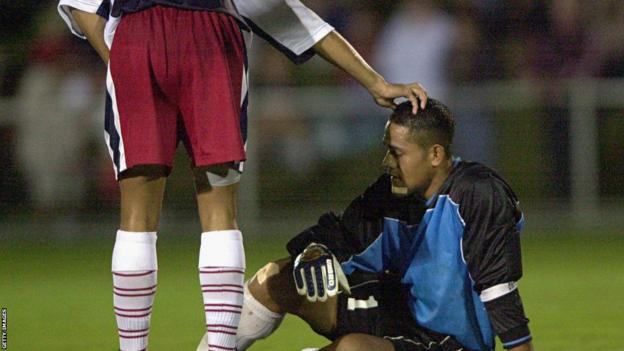
Imagine your worst day at work and then multiply it by 31. You may get close to what Nicky Salapu experienced on 11 April 2001.
That was the day the American Samoa goalkeeper was on the losing side during the heaviest loss in international football history.
Salapu told the Sporting Witness podcast that strangers still approach him to ask about the extraordinary contest.
The occasion was a World Cup qualifier with Australia. Fielding a hastily cobbled together team full of teenagers, American Samoa went on to ship 31 goals without reply.
Salapu, now 43, says he had to hide tears from his team-mates in the 31-0 defeat.
"I was trying to keep all that emotion in to wait until the game is over," he says.
There were plenty of mitigating factors in such a heavy loss. For a start, American Samoa's population at the time was only 58,000, compared to Australia's 19 million. The minnows had been admitted entry to Fifa only three years earlier.
On top of that, before qualifiers for the 2002 World Cup, Fifa stipulated that only players with an American passport would be allowed to represent the Pacific Island nation. Out of a squad of 20 players, Salapu was the only one who was eligible.
What followed was a desperate scramble to assemble a squad.
"We had to find anyone in two weeks," he explains. "We ended up selecting kids from high school."
With three 15-year-olds in their side and an average age of just 18, 20-year-old Salapu was a relative veteran.
Unsurprisingly, the team of novices got off to a bad start in their qualifying campaign, following up a 13-0 loss to Fiji with an 8-0 loss to Samoa. When they lost by a meagre 5-0 to Tonga in their third group game, it must have felt like a relative success.
Meanwhile, having narrowly missed out on qualification for the 1998 World Cup, Australia had a point to prove. The Socceroos came into their final group game against American Samoa having just punished Tonga 22-0.
Salapu says his primary ambition before the match was to "not pass the 22-0" mark.
It took eight minutes for Con Boutsianis to score Australia's first goal. Three minutes later Archie Thompson netted. By 27 minutes the 22-year-old, who had made two other appearances for his country, had scored a hat-trick. At the 75-minute mark he had notched up 13.
David Zdrilic helped himself to eight goals, while Boutsianis scored a hat-trick.

Nicky Salapu is consoled by team-mate Young Im Min
Salapu says he spent the match urging his team-mates "to go forward" rather than "bundling" in front of him, because he found it hard to see the ball at times.
American Samoa's one and only attack of the match occurred in the 86th minute, when they forced Australia goalkeeper Michael Petkovic to make a save.
Salapu says he thinks the Socceroos' approach was unsporting.
"How many goals do you need to have the differential?" he asks.
If he were coaching Australia that day, he says he would have told his team to "keep possession until the game is over" when they had scored 20 times.
Salapu had to wait 10 years before he could in any way expunge the memory of that humiliation. By this stage, American Samoa had racked up 38 consecutive defeats and a goal difference of minus 217. They were placed 204 in the Fifa rankings, sharing bottom spot with Andorra, Montserrat, Samoa and San Marino.
However, the team had just appointed Dutchman Thomas Rongen as manager and Salapu felt confident enough in the project to come out of retirement.
One of Rongen's innovations was to change formation from 4-4-2 to 4-2-3-1, providing better defensive cover.
On 23 November 2011 American Samoa faced Tonga in their first qualifying match for the 2014 World Cup.
Salapu says: "Our whole team was positive that we were going to win."
Just before half-time Tonga keeper Shalom Luanio bundled a shot from Ramin Ott into his own net.
In the 74th minute Kaneti Falela lobbed the ball over Luanio and scored American Samoa's second.
"I was so happy and I was like, 'I have to keep that emotion in because I have to focus in the game'," remembers Salapu.
Tonga got one back in the 87th minute, but it was not enough. The game finished 2-1 and American Samoa could finally enjoy their first Fifa-recognised victory.
A decade after that humiliation against Australia, Salapu had his redemptive moment.
"That was the first time I ever cried in soccer since 2001 against Australia," he says.
Rongen's achievement with American Samoa is chronicled in a 2023 Taika Waititi film Next Goal Wins, where the coach is played by Michael Fassbender.
Salapu still plays for the national side and son Dylan plays for the Under-17s as a midfielder.